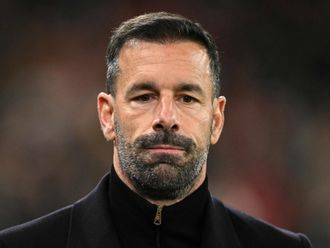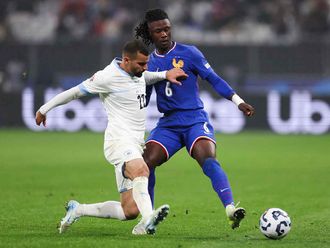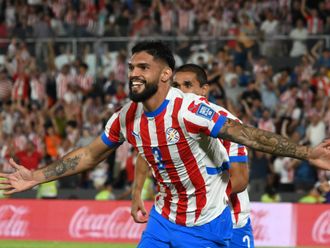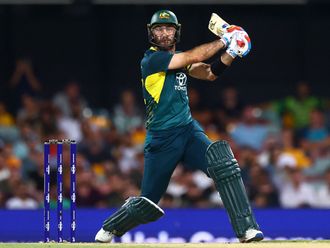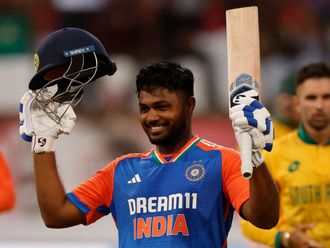Dubai: Despite a record four Fifa Under-17 World Cup wins and the production of numerous star names, Nigeria have always failed to live up to their promise at the senior World Cup.
The Super Eagles haven’t won a World Cup match since 1998, after crashing out in the group stages in both 2002 and 2010. They made the last 16 in 1994 and 1998, losing to Italy and Denmark respectively.
One theory for their inability to build on their youth success at senior level is down to European clubs raiding talent young and curtailing their creativity by forcing them into physical and defensive roles.
John Obi Mikel is a prime example of this. At Chelsea he plays in defensive midfield, while with Nigeria he’ll be the linchpin of creativity. His ability to revert will be key to their performance in Brazil.
To his credit, coach Stephen Keshi has been willing to give young Nigerian-based talent a chance and, unlike previous campaigns where overseas-based experience has shone individually but not in unison, that could make all the difference.
In four previous World Cup appearances, Nigeria have lost three times to Argentina in the group stages, twice in opening matches and once in the second game. Nigeria’s only saving grace in drawing their bogey team in the group for a fourth time is that they now won’t meet until the third game — before that, the Super Eagles have two beatable opponents in Iran and Bosnia and Herzegovina.
Keshi’s side could therefore finish second in the group and equal their best finish of reaching the last 16, with their most likely knockout opponents being potential Group E winners France.
Physical, fast and — on paper at least — exciting going forward, Nigeria promise goals but have failed to deliver in qualifying, while their defence is also disorganised and vulnerable at set pieces.
Nigeria
Group F
Fifa ranking: 44
Top man
|
John Obi Mikel |
|
Coach
|
|
Stephen Keshi |
Best 11 (4-3-3)
Enyeama; Echiejile, Omeruo, Oboabona, Ambrose; Uchebo, Mikel, Onazi; Moses, Emenike, Musa
Squad
Goalkeepers: Chigozie Agbim (Gombe United), Austin Ejide (Hapoel Beer Sheva), Vincent Enyeama (Lille)
Defenders: Efe Ambrose (Celtic), Elderson Echiejile (Monaco), Azubuike Egwuekwe (Warri Wolves), Kunle Odunlami (Sunshine Stars), Godfrey Oboabona (Caykur Rizespor), Kenneth Omeruo (Middlesbrough), Juwon Oshaniwa (Ashdod), Joseph Yobo (Norwich City)
Midfielders: Ramon Azeez (Almeira), Reuben Gabriel (Waasland-Beveren), John Obi Mikel (Chelsea), Victor Moses (Chelsea), Ogenyi Onazi (Lazio), Michael Uchebo (Cercle Brugge)
Forwards: Shola Ameobi (Newcastle United), Michael Babatunde (Volyn Lutsk), Emmanuel Emenike (Fenerbahce), Ahmed Musa (CSKA Moscow), Uche Nwofor (Heerenveen), Peter Odemwingie (Stoke City)
Group opponents
Argentina
Iran
Bosnia and Herzegovina
Qualifying campaign
Nigeria beat Ethiopia 4-1 on aggregate in the final round of CAF qualification after topping their second round pool ahead of Malawi, Kenya and Namibia.
World Cup history
First Tournament: 1994 (in USA)
Appearances: 4 (before 2014)
Best finish: Round of 16 (1994, 98)
Pros
- Nigeria head into the World Cup with confidence after winning last year’s African Cup of Nations. It was their third win in 14 appearances.
- Coach Stephen Keshi prefers impressionable Nigerian-based youth over older overseas-based experience. Youngsters may cope better with the conditions.
- The Super Eagles should fancy their chances of wrapping up qualification early with wins over Iran and Bosnia and Herzegovina before the tough test with Argentina.
Cons
- Emmanuel Emenike was Nigeria’s top scorer in qualifying with just three. In total they only scored seven.
- Nigeria haven’t won a World Cup match since 1998, their last two appearances in 2002 and 2010 were both winless group stage exits.
- Keshi’s youngsters looked over-awed on the international stage in last year’s Fifa Confederations Cup, where they were knocked out in the group phase



